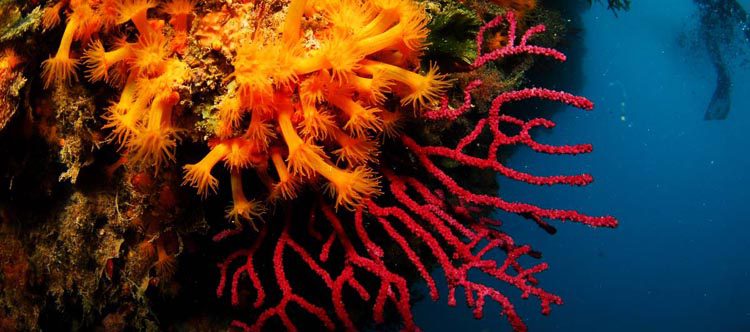Feature: Global Warming Causes the Disappearance of Corals and Beaches

Did you know that the climate change is the main cause of the disappearance of corals and gorgonians in the Mediterranean? Increased global temperature is causing a series of significant changes around the world. Melting ice caps and glaciers cause the sea level to rise, hurricanes are stronger and more frequent, droughts alternate with floods in coastal areas and many species, including corals, are in danger of extinction as their environments are altered.
In 1999, the high temperatures reached in the Mediterranean caused the massive death of corals and gorgonians in the Ligurian Sea and coasts of the French Provence. The plague was of such magnitude that between 60 and 100% of the existing colonies disappeared in some areas. Four years laters, a new plague struck Italy, France and Spain.
These plagues are not exclusive to the Mediterranean. In Australia, the Great Barrier Reef suffers a mortal bleaching epidemic due to the unusually high temperature of the ocean waters. Excessive water temperature makes corals expel the colourful algae that provide them with food. If the warm temperatures persist, corals die and reefs crumble. Some scientific studies affirm that this epidemic affects all coral species.
Why are corals important?
Corals provide food for different fish and molluscs while protecting them from their natural predators. It is estimated that they generate resources to feed roughly 2,000 million people. Once crushed by waves, the calcareous skeletons of corals form part of many tropical beaches important for tourism, while coral reefs prevent their disappearance.
What is Global Warming?
Global warming is the increase in the temperature of the Earth’s surface caused by greenhouse gases. These gases form a blanket around the planet that acts as a filter for sunlight. The Earth absorbs part of the sun’s heat and reflects the rest into the atmosphere. But part of this heat bounces off the blanket of greenhouse gases and returns to the Earth, causing an increase in temperature.
Global warming is not dangerous in and of itself because it is a natural process that makes our planet habitable. Without global warming, the changes in day and night temperatures would be similar to those of planets without an atmosphere. However, since the beginning of the industrial revolution, increased CO2 emissions and other pollutants have made this blanket thicker, leading to accelerated warming. Trees, plants and algae that live on top of corals absorb CO2 and produce oxygen but uncontrolled tree felling, increased desertification and the destruction of coral reefs reduce the reefs’ capacity to absorb this gas.
Did you know that…
… global temperature could increase between 1.9ºC and 3.9ºC by mid-century, the most significant increase in 1,000 years?
… there are more than 200 species of corals in the Mediterranean? And some can live at over 5,000 meters depth?
… some coral colonies can be over 1,000 years old?
… one person emits an average of 11 kg of CO2 per day?
… 75% of the electricity used to power home appliances is typically wasted during periods of inactivity?

